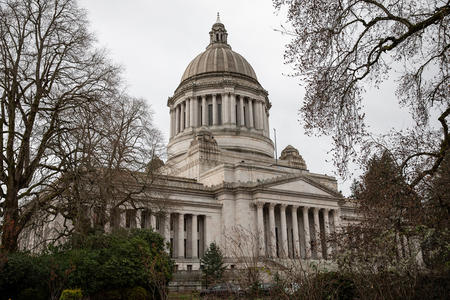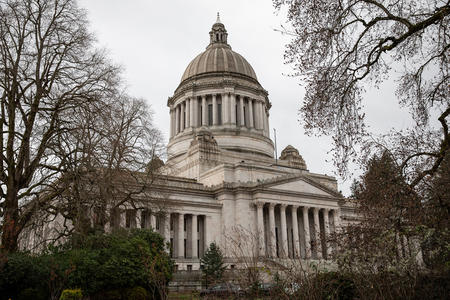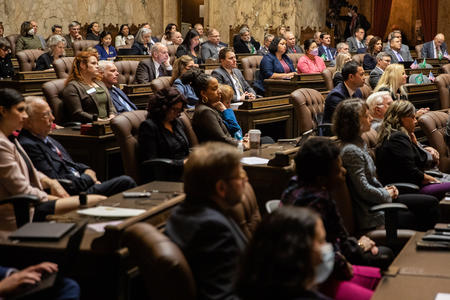In January, McClatchy broke the news that Washington lawmakers were blacking out hundreds of pages of communications – from legislation on the capital-gains tax and collective bargaining to a proposal to designate a Chinese American history month – despite a 2019 state Supreme Court order requiring them to disclose such records.
A joint investigation by Crosscut and McClatchy – which owns The Tacoma News Tribune, The Olympian, The Bellingham Herald and the Tri-City Herald – in February documented the untold story about how the Legislature has spent more than 15 years attempting to consolidate its power to keep secrets from citizens.
Now lawmakers will face a legal challenge to their use of legislative privilege in a lawsuit expected to combine the claims of transparency advocates with those of the Washington Coalition for Open Government, according to a board member of the advocacy organization.
Lawmakers are betting that justices will hand out a ruling that bakes the new secrecy clause into the state constitution – but the Court has turned down at least one other invitation to do so.
Meanwhile, legislators in the Democratic-controlled House and Senate this legislative session continued to lobby for and advance bills that chip away at the state Public Records Act, carving out more exemptions. In February, the state Sunshine Committee – tasked with reviewing exemptions to the law and trying to boost transparency – became so frustrated that they are considering disbanding.
It’s not just the Legislature. Over in the executive branch, all eyes are on Gov. Jay Inslee and whether he’ll run in 2024 for an unprecedented fourth term. A decade ago, Inslee took a rare step for a powerful politician: He swore never to invoke executive privilege, a constitutional secrecy right given to him by the high court in 2013 to withhold communications from the public. Washington’s next governor – likely a fellow Democrat, if past predicts future – is under no obligation to maintain that level of transparency.
A court decision that cements legislative privilege, a future governor who invokes an executive privilege, and further laws from the Legislature to restrict the Public Records Act could all add up to reshape Washington’s transparency climate in the coming years.
“I would hate to see Washington state backslide, because it is one of the best in the country on this," said David Cuillier, a professor at the University of Arizona who researches transparency laws and access to information.
"If Washington shifts its laws, it's going to be another Alabama," Cuillier added. "No offense to Alabama ... but I don't think that's what Washingtonians want."
The confluence of transparency issues could make the next year or so a moment for Washington’s dominant political party. Democrats now control just about every meaningful level of power in the state, a shift from even just a few years ago.
A spokesperson for Washington State Democratic Party Chair Shasti Conrad said she was unable to be reached for comment Wednesday, as she was in transit to Washington, D.C.
Rep. Gerry Pollet, a Democrat from Seattle first elected in 2012, said there are fewer elected officials in his party who openly support transparency, compared to prior years.
"I'd like to think that the Democratic Party writ large stands for openness, and has since I was a child," said Pollet, also a board member of the Washington Coalition for Open Government. "They're the party of the Freedom of Information Act, and the party of opening up public decisions.”
"I know that the grassroots political activists in the Democratic Party believe very, very strongly in the principles of open government,” he added.
Transparency benefits
Cuillier, a former Washington journalist who worked for the Tri-City Herald, the Everett Herald and The Vancouver Columbian, will soon direct the Brechner Center of Freedom of Information at the University of Florida.
He rattled off a slew of research papers documenting the benefits of government transparency, such as citizens having cleaner drinking water and restaurants maintaining higher cleanliness standards.
Every dollar spent on investigative reporting with documents earns society $287 in benefits, he said, citing a 2016 Harvard University Press case study on the economics of investigative journalism.
“It's critical that the public gets to see how the sausage is made, and what's going into the decisions that affect their lives,” Cuillier said. “And the only real way we can know that is to have access to their communications.”
To that end, Washington state has one of the highest compliance rates for making records available to the public, along with Idaho, Cuillier said, citing research he presented in 2019.
In interviews, Cuillier and open-government advocates in Colorado and Virginia describe an atmosphere of transparency rollbacks unfolding across the nation at the same time the federal government’s Freedom of Information Act continues to endure its own challenges.
"I think you will find from state to state an overall trend towards always trying to come up with more ways to withhold records, make it harder to get records, make it harder to enforce records law, all that kind of stuff,” said Megan Rhyne, executive director for the Virginia Coalition of Open Government.
Rhyne cited Washington’s transparency law as an envy of the nation: “Some of the things you are talking about, we wish we had.”
Cuillier, Rhyne and Jeffrey Roberts, executive director of the Colorado Freedom of Information Coalition, cited a key element of Washington’s Public Records Act that makes it so muscular: Judges can award damages and attorney fees to people who sue and beat the government in court.
“In fact, that's why Washington state has [some]of the best transparency compared to other states, because of those provisions in the law,” said Cuillier.
One lawmaker’s proposal
Government transparency isn’t a partisan issue: There are supporters on both sides. And both Republicans and Democrats have used legislative privilege – and members of both parties have criticized its use.
A handful of Washington's 147 state lawmakers have said they haven't – or won't – invoke legislative privilege to shield their communications. Others say it should be used as sparingly as possible. Lawmakers and legislative leaders have declined at times to discuss the use of legislative privilege, citing the pending legal challenge.
House Speaker Laurie Jinkins, D-Tacoma and Senate Majority Leader Andy Billig, D-Spokane, have said they will abide by whatever Supreme Court ruling is handed down on legislative privilege.
This week, a Republican House lawmaker announced a proposal he says could preserve government transparency while reducing costs for local governments that run afoul of the law.
Rep. Peter Abbarno, R-Centralia, introduced House Bill 1856, which would study the idea of a state ombuds office for transparency. If they are properly insulated from political actors, such offices can conduct independent reviews of the government.
The bill by Abbarno, who was first elected in 2020, seeks to bring together lawmakers, the chair of the state Sunshine Committee and members of the media to have a broad discussion about how to settle records disputes while getting documents to the people, and reducing payouts in damages by cities after judges find them in violation of the law.
Abbarno, who is the ranking Republican on the House State Government & Tribal Relations Committee, said the secrecy is not helping with the public's trust in government institutions.
"With access to social media, access to the internet, they know what government's doing, and so when decisions are made but they can't see the inner workings of the machine, I think they start becoming concerned," he said. "And sometimes rightfully so."
Abbarno cited Pennsylvania's Office of Open Records for resolving records disputes. Cuillier, the University of Arizona professor and open-government researcher, praised Pennsylvania's approach. A system like that "really helps empower the everyday person," Cuillier said.
But Cuillier and others stressed that ultimately enforcement through the courts is what makes Washington’s transparency law so strong. Abbarno said his proposal would be in addition to court enforcement of public records law, not a replacement.
House Bill 1856 has 23 other sponsors, all Republicans, and it is highly unlikely to be considered this year. But Abbarno says he plans to hold conversations over the summer and autumn about that approach.
Meanwhile, a new consolidated lawsuit that includes the Washington Coalition for Open Government is expected to be filed shortly after the legislative session ends, according to Joan Mell, a board member of the organization.
“We want to push back on that in a very direct way, and hope to get a final outcome in short order,” she said in an interview.
Storm clouds across government
Lawmakers use of legislative privilege to shield documents isn’t the only recent example of Washington officials avoiding avoiding public disclosure.
Nearly 200 text messages were found to be deleted from former Seattle Mayor Jenny Durkan’s phone that could have shed light on the city’s response to the social-justice protests of 2020, according to The Seattle Times. Text messages of other officials were likewise wiped out.
Last spring, Crosscut reported that officials involved in Washington’s once-a-decade redistricting process withheld dozens of texts between the appointed commissioners and legislative workers in the face of a request for public records. The commission later admitted in court that it broke the state’s Open Public Meetings Act – another key transparency law – in its efforts to redraw political districts across the state.
Cuillier says such examples pop up in other states, too.
But, "Any time it goes to court, of course, the courts generally side with transparency, and say 'It's the government's business, and the public has a right to see it,” he said.
Even a key state agency overseen by Inslee, who among other things has been lauded by open government groups for not shielding documents via executive privilege, has drawn some scrutiny on open government.
In April, a Thurston County Superior Court judge ruled that the state Office of Financial Management had violated the Public Records Act “for refusing to hand over initial offers in collective bargaining negotiations even after the parties had signed agreements,” according to a statement by the Citizen Action Defense Fund. The organization, which filed the legal challenge, bills itself as a nonprofit formed to restrain government overreach and promote open markets, among other things.
Washington is one of the strongest states for labor unions, and OFM – the budget office under the governor’s purview – negotiates contracts with public employee labor unions on state worker pay and other items. It’s a dynamic that has long rankled Republicans in Olympia.
In a statement announcing the victory, Jackson Maynard, executive director of the defense fund, referenced the ruling and other recent efforts by Democratic officials to shield records.
“The governing majority in Olympia and Seattle has been called into question the last several months over the failure to retain and disclose public records to the press and the citizens of our state,” wrote Maynard in the statement announcing the victory.
In an email, a spokesperson for OFM wrote that: “We are awaiting the final order in this case, which we anticipate will be signed April 28. Once we have the final order, we will review it to determine our next steps.”
The coming months will also see whether Inslee runs for an unprecedented fourth term. Pollet, the Seattle lawmaker and open-government advocate, said the next governor’s approach will be crucial, "because the governor can use their position to really advance openness."
"It's an important question for the next governor," Pollet said, who praised Inslee’s waiving of executive privilege and his broader example for the party. "Frankly, I'd love to see the next governor say, 'I'm going to have an open-government ombuds.'"
King County Executive Dow Constantine has declared he won’t run, making Department of Natural Lands Commissioner Hilary Franz and Attorney General Bob Ferguson perhaps the two highest-profile potential Democratic candidates.
Ferguson recently came in for scrutiny by Mell, the attorney and Washington Coalition for Open Government board member, in a Seattle Times opinion column. Among other things, Mell critiqued the way the Attorney General’s Office responds to public records, and claimed he hasn’t been vocal enough in speaking out against the various transparency transgressions.
In an email, Ferguson spokesperson Brionna Aho dismissed Mell’s critiques, writing that Mell represented the Northwest Detention Center, a privately run federal prison that lost a lawsuit to the Attorney General’s Office over wages for working incarcerated people: “So she is not happy with Attorney General Ferguson or our office.”
Among other things, Aho noted Ferguson’s staffing and support to the state Sunshine Committee for over a decade without assistance from lawmakers, and his office has “never supported legislation creating an exemption to the Public Records Act that did not have the support of the Sunshine Committee.”
In addition, Aho added that, “Attorney General Ferguson has publicly expressed his support for the governor’s decision not to claim executive privilege.”
This report was produced in collaboration with McClatchy, which owns The Tacoma News Tribune, The Olympian, The Bellingham Herald and the Tri-City Herald
Get daily news in your inbox
This newsletter curates some of the most important headlines of the day from Crosscut and other news outlets.






